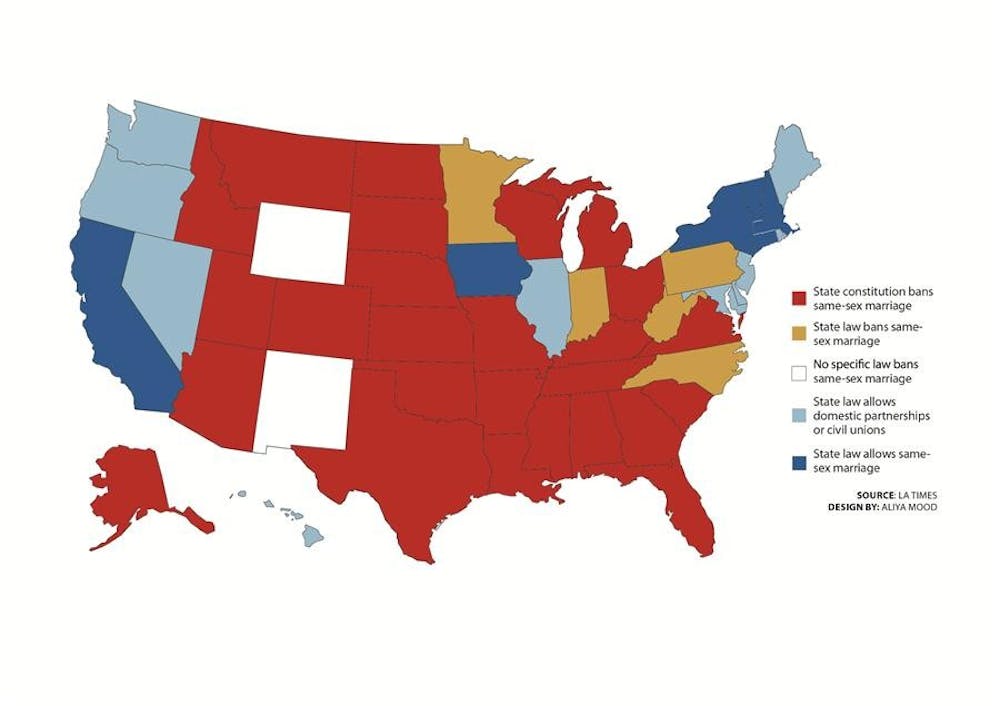A court ruling Tuesday made California the seventh state to legalize same-sex marriage. This decision came almost one year after Indiana legislators took the first step in approving a constitutional amendment prohibiting the practice.
The U.S. Court of Appeals for the 9th Circuit in San Francisco ruled Tuesday that California’s voter-approved Proposition 8, which banned same-sex marriages despite an earlier California state Supreme Court decision allowing them, was unconstitutional. The 2-1 decision marked another milestone in the Proposition 8 saga that began with the 2008 election.
The court said in its decision that Proposition 8 served no purpose “other than to lessen the status and human dignity of gays and lesbians in California.”
The decision has also sparked discussion about what could happen next for similar debates in Indiana, where courts could be influenced by the 9th Circuit’s decision, and for other states outside the court’s jurisdiction.
Proposition 8 supporters now have the option to appeal the decision to the full 9th Circuit or to the U.S. Supreme Court, the ruling of which would be the law of the land and binding throughout the country.
But the effects of Tuesday’s decision may not be as far-reaching as some think, sociology professor Brian Powell said.
“It’s not saying same-sex marriage is unconstitutional,” he said. “A court could rule that Proposition 8 is unconstitutional. That doesn’t mean courts are going to overturn same-sex marriage throughout the country.”
This is because this decision was tailored to California’s situation, Powell said.
“The first thing to realize is that the experiences in Indiana are very different from what’s going on in California,” Powell said. “In Indiana right now, the state legislature has voted to allow a referendum that will provide a prohibition against same-sex marriage in the state constitution.”
Last February, the Indiana House of Representatives approved a resolution authored by Reps. Eric Turner, R-Marion, and Dave Cheatham, D-North Vernon, to create a constitutional amendment defining marriage as between one man and one woman and preventing the state from creating “a legal status identical or substantially similar to that of marriage.” These provisions are already enacted through Indiana law.
In contrast, California had already allowed same-sex couples to marry after the state’s supreme court ruled that not allowing same-sex couples to marry was unconstitutional earlier in 2008.
“The majority ruling says that its decision is limited to the situation where, in California, same-sex marriage was lawful for a limited period of time, and then Proposition 8 effectively took it away,” said Daniel Conkle, a professor in the Maurer School of Law.
“Basically, the court is saying that it is more problematic to take away an existing right to same-sex marriage because there is that preexisting right.”
This logic might not be applicable to Indiana, he said, because Indiana has no history of allowing same-sex marriage. Same-sex couples in Indiana do not domestic partnerships rights, either, like they do in many states without same-sex marriage.
“Right now, Hoosiers are sort of battling over the question of same-sex rights, period,” Powell said.
For now, in Indiana, two steps remain for the same-sex marriage ban to become part of the state constitution. First, the 2013-14 General Assembly must pass the joint resolution. Second, voters must approve it.
Conkle said that although Indiana is on its way toward implementing a same-sex marriage ban to the constitution, some other states are moving in an opposite direction.
“Whenever a state recognizes, or in this case is forced to recognize, same-sex marriage, that creates one more state,” he said. “There is this sense of momentum.”
Powell said that in Indiana, public opinion generally opposes same-sex marriage, but throughout the country, a slim majority support it. Additionally, he said same-sex marriage legalization in larger states such as California and New York may affect others, including Indiana.
“I’m cautiously optimistic in the long run,” he said. “My sense is that, in the long haul, there’s going to be very strong carryover effects from the states.”
Prop 8 ruling may not influence Indiana's same-sex marriage amendment

Get stories like this in your inbox
Subscribe





